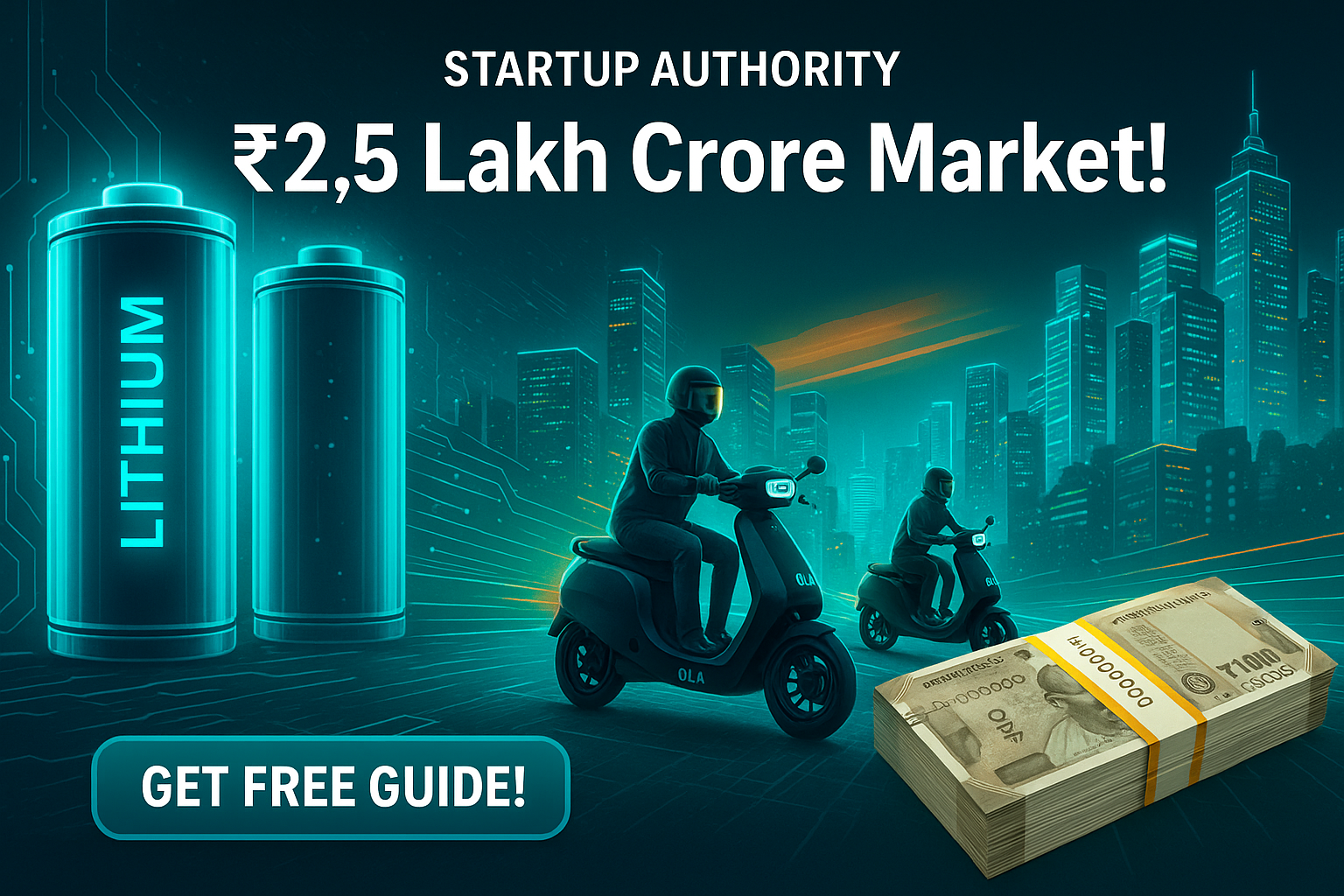EV Lithium Battery Manufacturing: The 2025 Business Idea to Power India’s Future
Electric vehicles (EVs) are no longer just a trend—they’re a movement reshaping India’s transportation and energy sectors. At every auto expo and in every budget meeting, EVs are the buzzword. But what powers this revolution? The real engine behind the electric dream isn’t just the vehicle—it’s the lithium battery.
And here lies a surprising fact: India still imports nearly 80% of its lithium batteries. Only 20% are manufactured locally, a figure that, according to an IBEF report (October 2024), has shocked policymakers and innovators alike. The same report projected that India’s clean energy market is set to hit $250 billion (₹2.5 lakh crore) by 2030.
What’s more compelling? You can start a lithium battery assembly business with just ₹10-15 lakh, and earn ₹5-10 lakh per month. This article explores how aspiring entrepreneurs can enter this booming sector—and lead the next energy wave.
The Pulse of India’s Energy Revolution
In my decade of reporting, from fintech unicorns to grassroots innovators, EV lithium battery manufacturing stands out for its sheer scale and urgency. These batteries power everything: Ather scooters, Tata’s Nexon EV, solar power systems, and even Tesla’s global supply chain.
According to S&P Global (April 2024), India’s battery demand will surge to 139 GWh by 2035, a 35-fold increase from current levels.
Yet, our overreliance on imports drives up costs and slows progress. As @EVIndia2025 put it on X:
“Local battery manufacturing is India’s next trillion-dollar bet!”
Why This Business Is Booming in 2025
Here’s why lithium battery manufacturing is among the best business ideas for 2025:
-
Huge Demand: EVs, solar systems, and smart electronics will push demand to new heights.
-
Low Competition: Tier-2 and Tier-3 cities still lack battery units, giving early movers an edge.
-
Government Support: Under FAME-II and PLI-ACC schemes, 20-40% subsidies are offered.
-
High ROI (Return On Investment): Small units can net ₹5-10 lakh/month, while larger ones can generate crores.
In Gujarat, one entrepreneur started with ₹12 lakh in 2024. He now supplies to Ola Electric, earning ₹8 lakh/month. “The PLI scheme covered 40% of our setup costs,” he shared.
How to Start Your Battery Business
Based on inputs from EVreporter, the Ministry of Heavy Industries, and industry insiders, here’s how to begin:
1. Get Certification with Premium Course
Enroll in a 1-2 month course on lithium battery pack assembly.
Recommended institutes:
-
IIT Madras
-
Skill India Centers (Gujarat, Tamil Nadu)
Cost: ₹50,000 – ₹1 lakh
No engineering degree required—just a basic understanding of electronics.
2. Set Up a Small-Scale Unit
Focus on battery pack assembly (1–2 kWh packs) for two-wheelers and solar storage.
Requirements:
-
Machinery: Electrode coating, assembly station, BMS testing kit.
Cost: ₹20–50 lakh -
Raw Materials: Lithium, cobalt, graphite (import or source from Amara Raja).
Monthly cost: ₹5–10 lakh -
Space: 2,000–5,000 sq ft. (Clean room preferred).
Rent: ₹50,000–₹2 lakh/month -
Staff: 5–10 trained technicians.
Salaries: ₹5–10 lakh/year
Apply for MSME loans or state subsidies to cut initial costs to ₹10–15 lakh.
3. Market Your Batteries
-
Target buyers: Ola, Ather, Mahindra, Luminous, or even Amazon resellers.
-
Go international: Export to Europe or Middle East (where clean tech is booming).
-
Platforms: IndiaMart, Flipkart, Alibaba, Auto Expo 2025.
-
Smart Cities: Bid for battery contracts under Smart City and R-Urban missions.
Investment & Earning Breakdown
| Component | Cost (₹) |
|---|---|
| Machinery | ₹20–50 lakh |
| Raw Materials (monthly) | ₹5–10 lakh |
| Space Rent | ₹50,000–₹2 lakh/month |
| Manpower | ₹5–10 lakh/year |
| Startup Total (with subsidy) | ₹10–15 lakh |
Revenue Example:
-
1 kWh battery pack sells for ₹10,000–15,000
-
10 packs/day = ₹1–1.5 lakh/day
-
Monthly: ₹20–30 lakh
-
Profit margin: ₹5–10 lakh/month
Marketing: Build a Brand That Powers India
-
Social Media: Post Reels of the battery assembly process. Use hashtags:
#EVIndia,#CleanEnergy,#LithiumPower. -
B2B Networking: Attend events like FICCI Clean Energy Forum, Renewable Energy Expo 2025.
-
Online Presence: Launch a website with success stories and case studies.
-
Tenders: Bid for government battery storage tenders in Smart City projects.
Common Challenges & Smart Solutions
| Challenge | Solution |
|---|---|
| High raw material costs | Partner with domestic vendors like Amara Raja or bulk-import from China |
| Regulatory compliance | Obtain MSME, factory license, BIS, and Pollution NOC |
| Safety risks | Install fire alarms, leak detectors, and follow CPCB safety protocols |
Why 2025 Is the Year to Begin
India’s EV momentum is real. The Economic Times predicts 30% of vehicle sales will be EVs by 2030. Batteries are the cornerstone—and the bottleneck. The government is spending big to fill the gap, and the market is wide open.
A startup from Tamil Nadu shared on LinkedIn:
“Started with ₹15 lakh in 2024. Now, we supply to Mahindra and earn ₹12 lakh/month!”
@StartupIndia posted on X:
“Lithium battery startups are India’s next unicorns. Get in now!”
Conclusion: Power Up Your Future
EV battery manufacturing isn’t just another business. It’s your chance to power the next generation of clean energy in India. With a growing ₹2.5 lakh crore market, rising domestic demand, and abundant government support, 2025 is your moment.
Start small, scale smart, and become part of India’s energy revolution. The future is electric—will you power it?
Disclaimer: The information provided in this post is for general informational purposes only and does not constitute professional advice. Please consult a qualified professional before making any decisions based on this content.
